Supply chain management and logistics are typically seen as supplementary functions of a company.
However, they’re the major functions that link the raw material supplier to the producer and the producer to the end consumer.
According to a recent study by Gartner, conversational AI can save logistics companies up to 30% in customer service costs.
Conversational AI in logistics focuses on using automation to improve the efficiency of the logistics industry and eliminate errors.
In this article, we will look at how conversational AI can help your logistic business in smoothening the operations, benefits, and use cases of conversational ai.
Conversational AI in the Logistics Industry
Conversational AI uses artificial intelligence and machine learning technologies to enable automated and intelligent conversations between humans and computer systems.
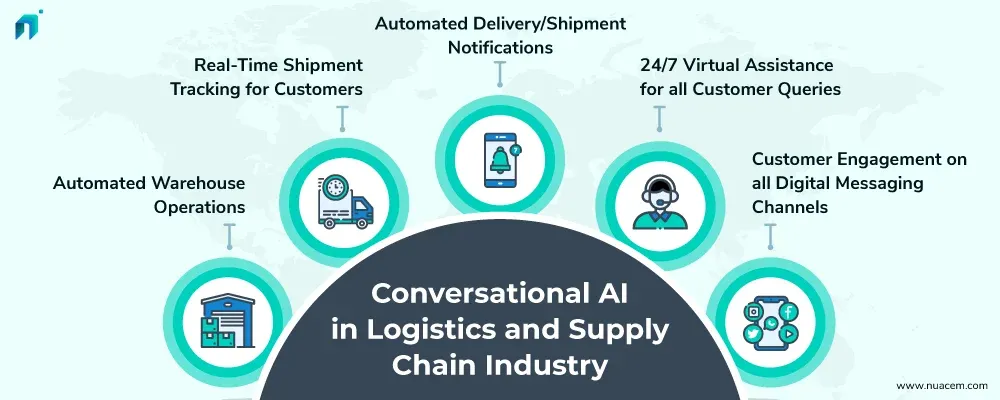
Conversational AI is revolutionizing how businesses communicate and interact with customers, suppliers, and internal stakeholders in the logistics industry.
Importance of Communication in Logistics Businesses
Communication plays a vital role in ensuring smooth operations in logistics businesses.
It serves as the backbone of supply chain operations and helps overcome various challenges that arise in the industry.
Role of Communication in Supply Chain Operations
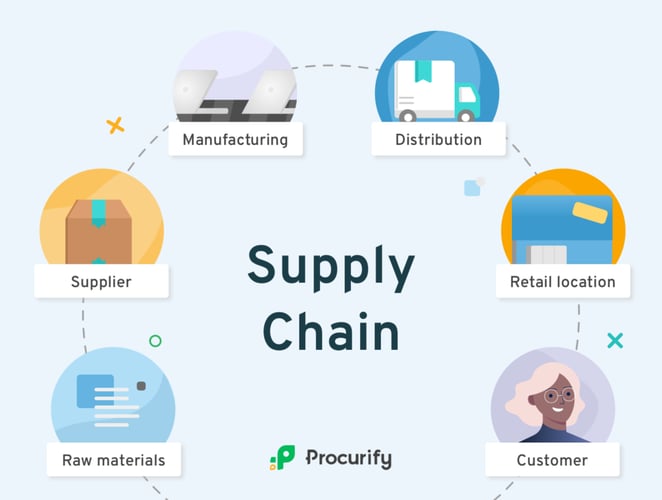
Effective communication is essential for coordinating various activities in the supply chain, such as order placement, inventory management, tracking shipments, and resolving any issues that may arise during the process.
Timely and accurate communication leads to faster cycle times, reduced delays, and improved customer satisfaction.
Challenges Faced in Logistics Communication
Logistics communication can be complex and challenging due to factors such as:
- Language barriers when dealing with international suppliers and customers
- Lack of real-time visibility into supply chain activities
- Manual and fragmented communication channels lead to miscommunication and delays
- Increased customer expectations for instant support and personalized engagement
How Conversational AI Improves Logistics Operations?
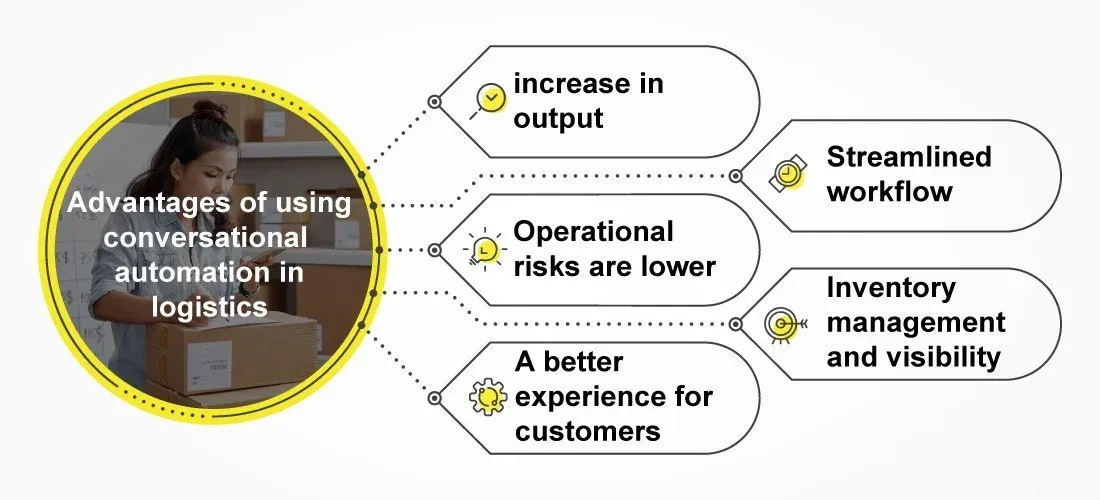
Conversational AI offers numerous benefits for streamlining communication and enhancing logistics operations. Let's explore some of the ways it can make a significant impact.
Streamlining Communication Channels
With centralized communication platforms powered by conversational AI, logistics businesses can combine various communication channels into one unified interface.
- Centralized Communication Platform: This eliminates the need for multiple tools and systems, simplifying communication and ensuring seamless collaboration.
- Real-time Messaging and Collaboration: Conversational AI enables real-time messaging and collaboration between different stakeholders involved in the supply chain.
This allows for quick decision-making, effective problem-solving, and improved team coordination, enhancing efficiency and productivity.
Enhancing Customer Service and Support

Conversational AI enables the use of AI-powered chatbots to provide instant customer assistance.
- AI-powered Chatbots for Instant Assistance: These chatbots can handle common inquiries, provide tracking updates, and even initiate proactive communication with customers, ensuring round-the-clock support and reducing the burden on customer service teams.
- Personalized Customer Engagement: By leveraging conversational AI, logistics businesses can provide personalized and tailored customer communication. AI algorithms can analyze customer data and preferences to deliver targeted messages, offers, and recommendations.
This enhances the customer experience and increases customer loyalty and retention.
Optimizing Supply Chain Efficiency

By integrating with other systems, AI-powered assistants can handle order placement, generate invoices, and provide real-time tracking updates to customers and internal stakeholders.
- Automated Order Processing and Tracking: Conversational AI can automate tedious manual tasks such as order processing and tracking. This streamlines operations reduces errors, and improves order fulfillment efficiency.
- Intelligent Inventory Management: Using conversational AI, logistics businesses can optimize inventory management by leveraging AI algorithms that analyze historical data, market trends, and demand patterns.
This enables accurate demand forecasting efficient stock replenishment, and minimizes the risk of overstocking or stockouts.
Benefits of Conversational AI in Logistics

Conversational AI benefits the logistics industry, revolutionizing communication and improving overall operations.
Let's explore some of these advantages:
Improved Efficiency and Productivity
Conversational AI eliminates manual and time-consuming tasks by automating communication and streamlining processes.
This leads to enhanced efficiency and productivity across the supply chain.
With real-time messaging and collaboration, teams can communicate seamlessly, make faster decisions, and solve problems more effectively.
Enhanced Customer Satisfaction and Loyalty

Conversational AI is vital in improving customer service and support.
With AI-powered chatbots, logistics businesses can offer instant assistance to customers at any time of the day.
This ensures prompt responses to queries, provides tracking updates, and resolves issues swiftly.
Such personalized and efficient customer engagement increases satisfaction, loyalty, and repeat business.
Cost Reduction and Resource Optimization
Adopting conversation, AI reduces costs by automating various manual tasks.
Automated order processing, tracking, and inventory management eliminate the need for excessive human intervention, reducing labor costs and minimizing errors.
Additionally, AI algorithms help optimize resource allocation, ensuring efficient use of assets and reducing wastage.
Data-Driven Decision Making
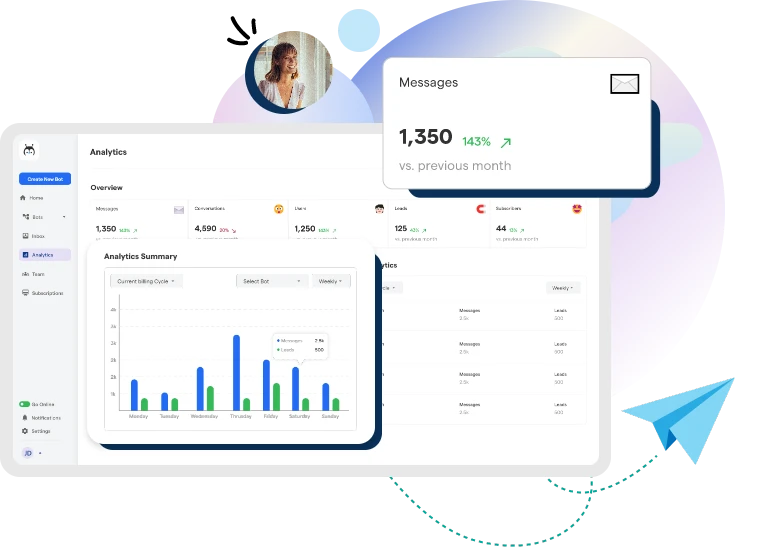
Conversational AI generates massive amounts of data through interactions and transactions.
Logistics businesses can derive valuable insights from this data by leveraging advanced analytics and machine learning.
These insights empower data-driven decision-making, enabling businesses to identify trends, predict demand, optimize routes, and strategically improve operations.
Implementing Conversational AI in Logistics Businesses
Implementing conversational AI in logistics requires careful planning and execution. Let's look at the necessary steps to integrate this technology successfully:
Identifying Business Needs and Goals

Before implementing conversational AI, businesses need to identify their communication challenges and goals.
Understanding the pain points and desired outcomes will help choose the right solution and define the implementation strategy.
Choosing the Right Conversational AI Solution
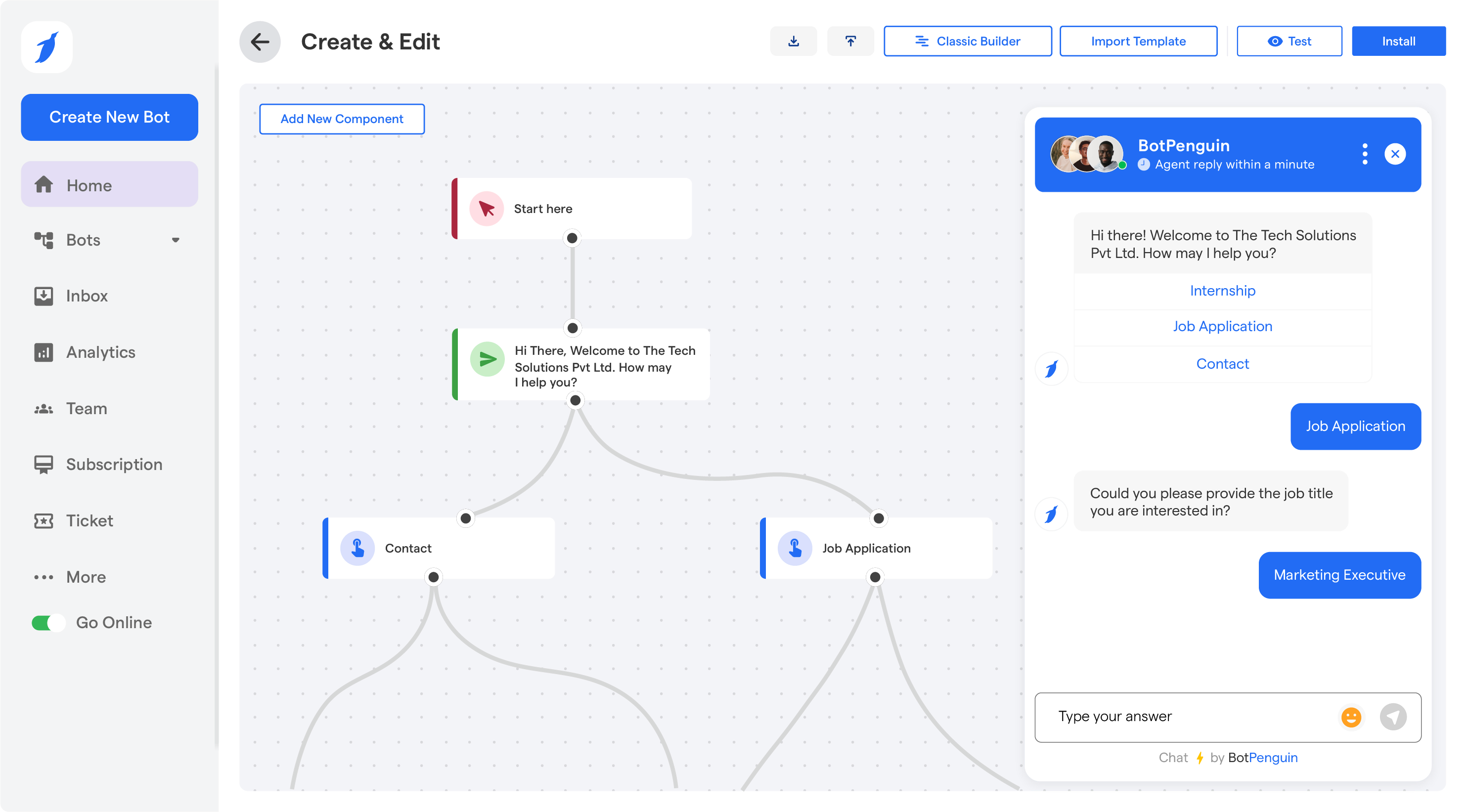
Various conversational AI solutions are available in the market, each with its strengths and limitations.
Businesses must evaluate different options based on their requirements, budget, and scalability.
Factors to consider include the features, language capabilities, customization options, and user-friendliness of the solution.
Integration and Training Processes
Once a conversational AI solution is chosen, the next step is integration.
This involves integrating the AI system with existing communication channels, customer relationship management (CRM) systems, and other relevant tools.
Seamless integration ensures a smooth transition and enables data flow between different systems.
Training the AI system is crucial for optimal performance. This involves feeding the system with data and training it to understand and respond accurately to various customer inquiries and scenarios.
Continuous monitoring and feedback loops are essential to refine and improve the AI's performance over time.
Challenges and Limitations of Conversational AI in Logistics
While conversational AI offers immense value, there are certain challenges and limitations that businesses should be aware of:
Language and Cultural Barriers
In the logistics industry, language barriers can pose challenges when dealing with international partners and customers.
Conversational AI must be equipped to handle translations accurately and understand the cultural nuances of different regions.
Striking the right balance between automation and human intervention is crucial for effective communication.
Suggested Reading:
Keep Your Logistics Business Moving with the WhatsApp Chatbot
Data Security and Privacy Concerns
Given the sensitive nature of logistics data, data security and privacy are significant concerns when implementing conversational AI.
Businesses must ensure that the AI solution complies with data protection regulations and has robust security measures to safeguard customer and business information.
Balancing Automation with Human Intervention
While conversational AI streamlines communication, balancing automation and human intervention is important.
Some scenarios may require the expertise and empathy of a human representative.
Businesses should carefully design the AI system to seamlessly escalate conversations to humans when necessary and provide a seamless customer experience.
Future Trends and Outlook of Conversational AI in Logistics
As conversational AI continues evolving and disrupting industries, the logistics sector is poised to experience significant transformations and transformations.
Let's explore some exciting future trends and the potential impact of conversational AI in logistics:
Advancements in Natural Language Processing

Natural language processing (NLP) is at the core of conversational AI, enabling machines to comprehend and respond to human language.
In the future, NLP algorithms will become even more sophisticated, improving accuracy and enabling AI systems to understand context, emotions, and complex queries.
This will lead to more realistic and effective human interactions and AI-powered chatbots across the logistics journey.
Potential Impact on Freight Transportation and Last-mile Delivery
Conversational AI has the potential to revolutionize freight transportation and last-mile delivery, tackling major challenges faced by the logistics industry.
AI-powered chatbots can optimize and automate route planning, considering traffic patterns, weather conditions, and delivery constraints.
This will lead to more efficient fleet management, reduced fuel consumption, and faster delivery times.
In the context of last-mile delivery, chatbots can provide real-time updates to customers, allowing them to track their orders and receive accurate estimated arrival times.
Conversational AI can also help optimize delivery routes by considering customer preferences, traffic congestion, and delivery windows, ensuring successful first-time deliveries and customer satisfaction.
Integration with IoT and Blockchain Technologies

One of the key future trends is the integration of conversational AI with the Internet of Things (IoT) and blockchain technologies.
By combining these technologies, logistics businesses can create a seamless ecosystem that ensures end-to-end visibility, enhances security, and enables efficient tracking and verification of goods.
Chatbots integrated with IoT devices can provide real-time shipment updates, monitor conditions, and proactively address any issues.
Blockchain technology can further enhance the transparency and trustworthiness of logistics operations.
Smart contracts powered by AI can automatically execute agreements and transactions, reducing paperwork, eliminating intermediaries, and ensuring secure and tamper-proof records.
Conclusion
Finally, we would like to conclude with a survey. According to an Eyefortransport report, only 4% of firms use AI in their supply chain, which could be much higher.
Conversational AI application for logistics is growing in popularity as the demand for products and the need to expand reach grows.
Indeed, every firm must concentrate on decreasing errors and increasing efficiency. Amazon and Flipkart, for example, are fully focused on applying technology aid to increase that flow. And it shows in their degree of client satisfaction.
And if achieving the same for your logistics business is what you think of, then contact BotPenguin for effective chatbot solutions today!
Suggested Reading:
Why is BotPenguin the best Conversational AI Platform?
Frequently Asked Questions (FAQs)
How can conversational AI enhance efficiency and productivity in my logistics business?
Conversational AI automates tasks, streamlines communication, and enables real-time collaboration, improving efficiency and productivity across the supply chain.
Can conversational AI help improve customer satisfaction in the logistics industry?
Yes, conversational AI enables instant assistance, personalized support, and quick problem resolution, enhancing customer satisfaction and loyalty.
Will implementing conversational AI in my logistics business reduce costs?
Yes, conversational AI automates manual tasks, reduces errors, and optimizes resource allocation, leading to cost reduction and resource optimization.
How can conversational AI enable data-driven decision-making in logistics?
Conversational AI generates valuable data that can be analyzed to identify trends, predict demand, optimize routes, and make strategic improvements in logistics operations.
Are there any challenges or limitations when implementing conversational AI in logistics?
Language and cultural barriers, data security, and the need to balance automation with human intervention are challenges when implementing conversational AI in logistics.
What are the trends and outlook for conversational AI in the logistics industry?
Advancements in natural language processing, integration with IoT and blockchain technologies, and the potential impact on freight transportation and last-mile delivery are key future trends to watch out for.

